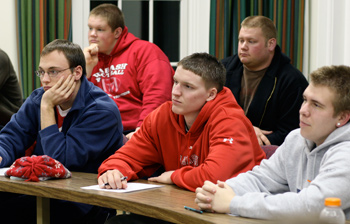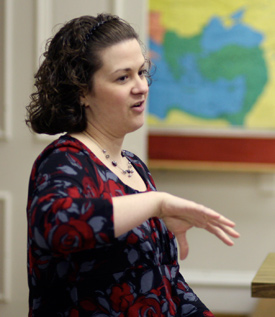Despite the snow and ice Tuesday night, Wabash’s W.A.R. Council saw another warm reception for its third "6-Pack" talk. The subject was "How to drink without getting a hangover, how to have a great night and morning" presented by Kim Johnson of the College’s Public Affairs office. Johnson had worked in community health before coming to Wabash.
As students milled in, Johnson hit the ground running. "I was the token ‘alcohol’ speaker when I first started working (at Purdue)." Whenever a group needed to hear about the dangers of irresponsible drinking, she was there. Johnson received her Bachelor’s degree in Health Promotion, and a Master’s in Health Education; she spent more than 15 years working with students and promoting healthy, responsible behavior.
 To illustrate the purpose of the night’s discussion, she offered an analogy. "Imagine I take three or four of the students here to the lake with me, and we go fishing. Now imagine, we’re all having a good time in the boat, and I take out a drill. Then, I start to drill a hole in my section of the boat. The other guys might say, ‘What are you doing?’ And I would just say, It’s my part of the boat, I can drill here if I want to. As you can see, we’re all in the boat together. Even if I’m only drilling in my section, it affects the others. Alcohol abuse might be done by an individual, but it affects everything around them."
To illustrate the purpose of the night’s discussion, she offered an analogy. "Imagine I take three or four of the students here to the lake with me, and we go fishing. Now imagine, we’re all having a good time in the boat, and I take out a drill. Then, I start to drill a hole in my section of the boat. The other guys might say, ‘What are you doing?’ And I would just say, It’s my part of the boat, I can drill here if I want to. As you can see, we’re all in the boat together. Even if I’m only drilling in my section, it affects the others. Alcohol abuse might be done by an individual, but it affects everything around them."
She then had the crowd’s attention.
Quickly, Johnson turned the lecture into an almost classroom discussion. Instead of listing fact after fact, she began to question the students on their alcohol knowledge.
"Quiz time, what is alcohol?" Students were quiet at first, then it became like any other discussion based course. "What are alcohol’s properties? How much of it can your body get rid of in an hour?" Students shouted answers and Johnson would sort the fact from fiction. Between her explanations of the chemical composition of ethyl alcohol, to touching on the subject of the natural "detox" performed by the liver, it was evident she knew her stuff.
 "Ok, forget about everything about drinking right now, all the effects and problems, and just concentrate on the hangover," asked Johnson, moving on to the topic at hand. She asked the crowd to think of everything that came with a hangover: the nausea, the headaches, the irritability. The students offered more to the list. Missing classes, sensitivity to light, and throwing up in friends’ rooms were all mentioned; things seen as typical in college life. However humorous the replies might have sounded, students didn’t laugh when she asked, "What do you think the impression is when a person in Crawfordsville sees a stumbling, hungover student?"
"Ok, forget about everything about drinking right now, all the effects and problems, and just concentrate on the hangover," asked Johnson, moving on to the topic at hand. She asked the crowd to think of everything that came with a hangover: the nausea, the headaches, the irritability. The students offered more to the list. Missing classes, sensitivity to light, and throwing up in friends’ rooms were all mentioned; things seen as typical in college life. However humorous the replies might have sounded, students didn’t laugh when she asked, "What do you think the impression is when a person in Crawfordsville sees a stumbling, hungover student?"
Then came the main event.
"So, who wants to know how to prevent a hangover? Well, my answer - don’t drink." Johnson smiled as many of the students laughed. She gave a quick list to the 21 and over crowd: "Have a plan (how much you will drink and over what period of time), avoid drinking games, drink at least 8 oz. of water with every alcoholic drink, limit yourself to one drink an hour, consume only one type of alcohol, be sure to eat before, stay away from anything you don't open yourself - especially punch bowls, don’t use drugs (illegal or over the counter), avoid highly-caffeinated mixers, and don't be afraid to not drink." She used particular emphasis when she discussed avoiding high-pressure situations and begged the crowd to look out for their drinking friends.
"Of course, for those who don’t avoid the hangover, there are a few ways to fight it off in the morning. Water, rest, eating a meal with protein, complex carbs, juice for vitamins, and a little exercise will help after a night of heavy drinking. But in the end you just have to wait it out," she offered. "But please, what I want you to take away from this is more than how to just avoid getting a hangover. Remember, your actions affect others. If you aren’t ready to face the consequences, don’t do it."
Students seemed to enjoy the discussion.
Christopher Zabriskie ‘12, learned something new. "It was interesting, informative, and a good warning about the dangers of drinking. I knew most of it already, but the information on water seems helpful."
Patrick Griffith, a member of the W.A.R. Council, liked the size of the crowd. "I was excited about the participation compared to the last two talks. I expect as much of a turnout for the next three meetings."
Photos by Steve Abbott '09